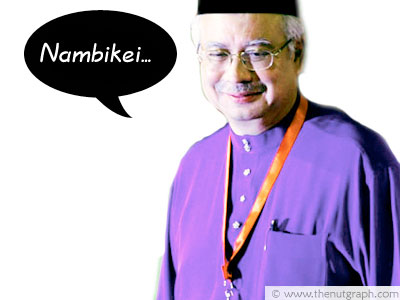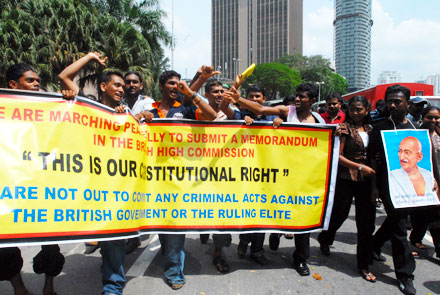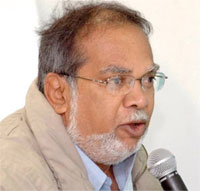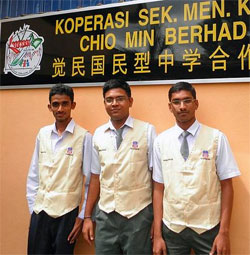
PRU13: Masa untuk menilai semula prestasi BN
Cubalah kita bayangkan jika anda adalah seorang pemilik sebuah syarikat perniagaan dan apakah yang akan anda lakukakan jika sekiranya ada seorang “pekerja” anda yang tidak pernah mempamerkan prestasi yang memuaskan sepanjang tempoh penggajiannya dengan syarikat anda? Kenapa? “Pekerja” yang prestasinya yang tidak baik selama ini sudah tentunya akan menerima tindakan yang sewajarnya, sama ada penggantungan kerja ataupun penamatan perkhidmatan. Dan ini adalah merupakan suatu keadaan yang hampir sama sekali apabila tibanya pilihanraya umum ke-13 (PRU13) tidak lama lagi.
Kita semua selaku rakyat dan pengundi umum adalah merupakan “majikan” kepada kerajaan yang dipilih dan oleh itu, kita akan menilai semula prestasi kerajaan apabila PRU menjelang pada setiap lima tahun. Di dalam PRU 2008 yang lalu, rakyat telahpun memberikan satu peringatan dan amaran keras kepada kerajaan persekutuan BN agar berubah atau menghadapi penyingkiran di dalam PRU yang akan datang.
Namum demikian, nampaknya rakyat jelata dilihat akan memberikan BN satu lagi peluang apabila kerajaan BN tanpa segan silu merasuah kita semua, selaku “majikan” dengan pemberian RM500 seorang, permohonan maaf yang tidak begitu ikhlas dan pelbagai-bagai janji-janji manis kononnya mereka akan berubah menjadi lebih baik.
Jika sekiranya amalan ini berlaku di sesebuah syarikat swasta di mana seorang pekerja yang cuba merasuah majikan untuk terus bekerja di situ, sudah tentu pekerja tersebut akan disingkirkan serta-merta kerana cubaan merasuah majikan. Perkara yang sama inilah yang kini cuba dilakukan oleh kerajaan BN terhadap rakyat jelata.
Apakah jenis “pekerja” ini? Dari masa ke semasa, kerajaan BN sering merayu rakyat agar mereka diberikan peluang dan kita senantiasa memberi laluan yang begitu mudah untuk kerajaan BN untuk kembali berkuasa pada setiap PRU. Akan tetapi, BN sering memungkiri janji-janjinya dengan tanggapan rakyat akan mudah lupa. Ini sememangnya sikap para pemimpin BN, seringkali menabur pelbagai janji dan akhirnya memungkirinya apabila PRU berlalu.
Jika anda adalah “majikan” di dalam keadaan di atas, sudah tnetu “pekerja” sebegini akan disingkirkan dan digantikan denhan pekerja baru yang lebih berkebolehan. Inilah yang kita perlu tunjukkan kepada kerajaan BN siapakah yang sebenarnya Bos di negara ini.
Dan dengan kad laporan prestasi BN inilah akan dijadikan sebagai satu daya pengukur di dalam persidangan parlimen yang telahpun berlangsung dari 12 Mac hingga 12 April dan berdasarkan keadaan yang terkini, sidang parlimen ini mungkin menjadi seesi yang terakhir buat BN.
Isu-isu hangat
Antara isu-isu yang dijangka “akan cuba dibangkitkan” oleh ahli-ahli parlimen gabungan pembangkang, Pakatan Rakyat (PR) adalah seperti yang berikut:
1) Skandal kondo-lembu NFC,
2) Penetapan kadar gaji minimum,
3) Skim kesihatan 1Care,
4) Pembinaan kilang penapisan sisa toksik Lynas,
5) Kos Lebuhraya Ekspres Kinrara-Damansara (KIDEX) yang semakin meningkat,
6) Janji BN untuk membina enam buah sekolah jenis kebangsaan (Tamil) yang masih tinggal janji,
7) Pembiakan nyamuk yang diubahsuai secara genetik,
8) Penyenaraian saham Felda.
Perkataan “akan cuba dibangkitkan” digunakan pada perenggan yang lalu kerana di kebanyakan seesi persidangan parlimen yang lalu, ahli-ahli parlimen PR tidak diberikan masa yang mencukupi untuk mengemukakan soalan ataupun membahaskan sesuatu perkara demi kepentingan rakyat dan negara.
Pertama, siasatan terhadap skandal kondo-lembu NFC itu telah mengambil masa yang begitu lama sekali di dalam menentukan sama ada para pengarah syarikat berkenaan harus didakwa atau sebaliknya. Malah pihak polis dan pejabat peguam negara saling tolak menolak hasil kertas siasatan sebelum ini. Adakah ia merupakan suatu taktik kerajaan BN untuk melengahkan masa dan keadaan agar rakyat akan mudah melupakan kes tersebut? Akan tetapi, para pemimpin PR terus berusaha memberikan tekanan yang menyeluruh terhadap kes tersebut yang akhirnya berjaya dikemukakan ke mahkamah untuk didakwa para pesalahnya.
Kita tengoklah apa yang telah berlaku pada kes skandal Port Klang Free Zone (PKFZ) yang menyebabkan kerugian berjuta-juta Ringgit. Walaupun bekas presiden MCA dan bekas menteri pengangkutan Dr Ling Liong Sik yang kini sedang didakwa berkaitan kes berkenaan, namum, satu demi satu bukti-bukti skandal dilesap atau dihilangkan dengan begitu sahaja agar kerajaan BN tidak akan menerima tamparan akibat daripada siri perbicaraan tersebut.
Sementara isu yang kedua pula adalah mengenai penetapan kadar gaji minima yang kini hangat diperkatakan ramai. Apabila PR mengemukakan cadangan gaji minimanya pada kadar RM1100 sebulan melalui pembentangan Bajet Alternatif 2012 ppada 4 Oktober 2011 yang lalu, para pemimpin BN dengan lantas mentertawakan cadangan tersebut bagaikan jenaka.
Kini tiba giliran BN pula yang akan mengemukakan cadangan gaji minimanya pada kadar di antara RM880 hingga RM900 sebulan yang dianggap rakyat jelata terlalu rendah berbanding dengan kenaikan kadar inflasi yang begitu mendadak. Seperti biasa golongan pekerja akan terus menjadi mangsa. Suatu perseimbangan kadar di antara majikan dan pekerja perlu diwujudkan bagi menangani masalah inflasi yang kini semakin meningkat agar suatu kadar gaji yang adil dapat dilaksanakan dan tidak membebankan kedua-dua belah pihak.
Isu yang ketiga melibatkan skim insurans kesihatan 1Care yang penuh dengan misteri. Adalah difahamkan bahawa 10 peratus daripada gaji pekerja swasta akan dipotong pada setiap bulan untuk disalurkan kepada 1Care. Menurut BN, insurans sedemikian adalah untuk membantu mereka yang memerlukan rawatan bagi penyakit-penyakit yang serius. Tetapi, apakah yang akan berlaku jka sekiranya wang di dalam 1Care itu tidak digunakan oleh mereka-mereka yang sentiasa sihat dan tidak mempunyai sebarang penyakit? Ahli-ahli parlimen PR kini sedang memberikan tekanan yang menyeluruh terhadap timbalan presiden MCA dan menteri kesihatan Liow Tiong Lai agar mengemukakan maklumat yang lebih terperinci, namum sehingga hari ini Liow masih membisu dan enggan menggulas lanjut.
Kontroversi yang seterusnya adalah pembinaan kilang pemprosesan sisa toksik Lynas di Gebeng, Pahang. Sebelum projek pembinaan itu dilaksanakan kerajaan BN telah merahsiakan tujuan pembinaan kilang itu daripada rakyat. Namun, akhirnya rakyat tetap juga mengetahuinya dan keluar beramai-ramai untuk membantah projek Lynas tersebut. Apakah yang telah berlaku pada slogan “Rakyat Didahulukan” uang sering dilaung-laungkan oleh perdana menteri dan presiden Umno Najib Razak sebelum ini?
Kalaulah Lynas itu merupakan satu projek yang selamat dan berfaedah seperti yang didakwa oleh Najib, kenapa pula merahsiakannya daripada rakyat sebelum ini? Dan kenapa pula kilang tersebut tidak dibina di atas tanah Australia itu sendiri oleh kerana syarikat itu milik pelabur Australia?
Walau macam manapun, ahli-ahli parlimen PR akan tetap meneruskan tekanan mereka di dalam parlimen agar kilang tersebut segera ditutup demi memastikan keselamatan dan kesihatan rakyat jelata tidak tidak tergadai begitu sahaja demi keuntungan sesetengah pihak yang didokong oleh BN.
Bagi projek Lebihraya Ekspres Kinrara-Damansara (KIDEX), kita juga dapati bahawa kos projek pembinaan tersebut telah meningkat secara mendadak sehingga mencecah RM2 bilion dan persoalannya adalah kenapa projek pembinaan tersebut tidak ditawarkan melalui proses tender terbuka seperti yang diwajibkan mengikut undang-undang?
Selain daripada itu, kerajaan BN sebelum ini telah berjanji kepada masyarakat India bahawa 6 buah Sekolah Rendah Jenis Kebangsaan Tamil (SRJKT) akan dibina tidak lama lagi, namum sehingga pada hari ini, janji tersebut hanya tinggal janji dan kerajaan BN masih tetap menjanjikannya tetapi tidak memberikan sebarang tarikh perlaksanaan tersebut. Persoalannya adalah bila? Adakah ianya hanya merupakan suatu tipu muslihat agar masyarakat India kembali menyokong BN pada PRU yang akan datang?
Isu yang ketujuh pula adalah berkenaan projek pembiakan sejenis nyamuk yang dibuat secara genetik bagi memerangi ancaman nyamuk aedes, namum tidak ada maklumat terperinci yang dapat dikemukakan oleh kementerian kesihatan bagi memastikan pembiakan baka baru nyamuk tersebut tidak mengamcam orang ramai khususnya kanak-kanak. Apa yang pihak kementerian berikan sehingga pada hari ini adalah hanya maklumat-maklumat yang masih kabur dan tidak jelas.
Cadangan penyenaraian Felda di dalam Bursa Saham oleh kerajaan BN turut menerima bantahan yang begitu hebat daripada para pemimpin PR dan sebilangan besar peneroka Felda itu sendiri yang telah melihat penyenaraian tersebut bakal mengancam kedudukan dan kebajikan mereka sebagai peneroka di masa yang akan datang. Walaupun kerajaan BN sebelum ini telah menjanjikan pulangan yang paling lumayan daripada penyenaraian Felda, namun para peneroka Felda masih tidak berpuashati mengenai maklumat-maklumat urusan tersebut yang dikatakan tidak telus dan kurang jelas serta tidak mudah difahami.
Oleh yang demikian, kajian semua terhadap penyenaraian itu adalah perlu bagi memastikan kebajikan para peneroka Felda ini tidak tergadai dengan begitu sahaja pada masa yang akan datang.
Ketidakseimbangan dalam parlimen
Masalah yang utama sekarang adalah di kebanyakan seesi persidangan parlimen, ahli-ahli parlimen PR selalunya tidak diberikan peluang yang mencukupi bagi membahas dan mengemukakan soalan-soalan yang berkaitan. Selain daripada itu, ramai di antara menteri-menteri kerajaan BN juga gagal atau tidak dapat memberikan jawapan yang sempurna apabila disoal mengenai beberapa perlaksanaan dan projek di bawah kelolaan kementerian masing-masing.
Maklumat mengenai persidangan parlimen yang diperolehi daripada rekod Hansard sering menunjukkan ahli-ahli parlimen BN dan menteri-menteri khususnya daripada Umno suka menunjukkan tingkahlaku yang tidak profesional apabila sedang bersemuka dengan ahli-ahli parlimen PR yang lebih giat menumpukan perhatian mereka terhadap tanggungjawab mereka sebagai ahli parlimen.
Sementara speaker dan timbalan speaker parlimen yang kedua-duanya ahli BN juga asyik menghalang seesi perbahasan yang efektif daripada berjalan dengan lancar khususnya di pihak PR dengan alasan “masa tidak mencukupi” dan pada masa yang sama akan memberikan masa yang lebih panjang kepada ahli-ahli parlimen BN untuk berbahas dan mengemukakan sokongan mereka.
Keadaan tersebut juga telah menyebabkan ketidakseimbangan kuasa di dalam parlimen dan mengakibatkan keseluruhan persidangan tersebut menjadi kurang berkesan dan tidak adil sama sekali pada akhirnya.
Tibalah masa untuk rakyat untuk menunjukkan kepada BN siapakah “majikan” sebenarnya daripada terus dibuli sedemikian. Lebih baik BN ini digantikan dengan seberapa segera yang boleh, agar negara ini dapat kembali ke pangkal jalan demi kepentingan rakyat jelata.
Malaysia Chronicle









